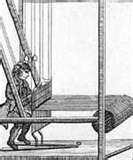
THE PLIGHT OF THE COTTON WEAVERS
LISBURN, MAZE AND BROOMHEDGE IN 1862-1863
 ON
May 28, 1863 the News Letter reported the emigration of a
large number of cotton weavers from Lisburn on the Old
Hickory for the United States.
ON
May 28, 1863 the News Letter reported the emigration of a
large number of cotton weavers from Lisburn on the Old
Hickory for the United States.
The newspaper said 253 emigrants including women and children had assembled at Lisburn station at 11.30 in the morning. They were accompanied by an "immense number of friends and neighbours, and by many inhabitants of the town who desired to take a last farewell of the honest and industrious people that were going out from amongst them to seek their fortunes in a foreign land."
The News Letter said the "leave taking was very affecting." The emigrants were accompanied by members of the Lisburn committee which had been involved in efforts to prevent the unemployed hand loom weavers from starving.
"Hands were warmly pressed. old friends were caught in hurried parting embraces, and many a tear started unbidden to the eye of those who were present. The train left the station at half past eleven o'clock and shortly before noon arrived in Belfast, where a large number of carts and lorries, kindly sent by Mr J Richardson, were waiting to convey the emigrants and their luggage from the railway to the quay."
The procession passed through the centre of the town presenting a depressing spectacle to onlookers.
"The carts were laden with the boxes and trunks that contained almost all that hard times had left the weavers. Upon theme was placed the bedding they still possessed and higher still were their wives and little ones, for whose sake, it may easily be supposed, much more than their own, they were leaving behind theme their mother country - a mother that had denied them even a bare supply of food - and were going to seek employment in a far distant land." '
The News Letter reporter was clearly moved by the sad spectacle and, in particular, by the children as they clutched their band boxes containing their valuable treasure which they were anxious not to leave behind.
"Some of the little ones were too young to know how-great a change they were making, and looked, with wonder painted on their faces, 'at the large warerooms and shops that lined the streets through which they passed, "he wrote.
The emigrants exuded a confidence_ that "the future could not be much worse than. the past, and might be a great deal better when the persevering and industrious men who walked by their side, their fathers, husbands and_ brothers, would go along with them.
A crowd of between 3,000 and 4,000 had gathered on the quays to watch the emigrants sail away on the Old Hickory which had brought a cargo of flour, a gift from the people of Philadelphia, to the distressed in Ulster. As the vessel pulled away from the quay there were hearty cheers from bystanders, "and many a prayer was audibly uttered for a prosperous voyage and a happy future."
The News Letter reporter added; "The emigrants responded with all the warmth of Irish hearts to the farewell from those on shore. It is seldom that a scene so impressive has been witnessed in this town as that at the departure of Old Hickory."
The America to which the Lisburn weavers were headed was in the throes of a bloody civil war which in May' of 1863 showed little sign of resolution.
The Old Hickory would have to run the risk of interception by Confederate warships which frequently crossed the Atlantic into British waters. Earlier in the year - in February -- the News Letter had carried a report concerning a meeting in Southampton between the Federal sloop Tuscarora and the Confederate steamer Nashville.
The incident had prompted the Times to declare that "these miserable belligerent ships that go steaming about within our ports have become a nuisance. It is as if two potboys insisted upon fighting out their quarrel in the Royal Exchange, to the derangement of the business of the city. It might be supposed that there were no international police regulations in the world, and that we were not strong enough to protect our own peace and quietness in our own harbours."
F. G. Watson
